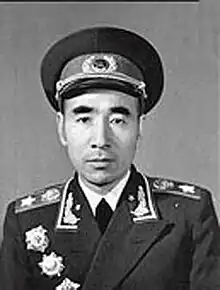Portal:Communism/Selected biography/46
Lin Biao (pinyin: Lín Biāo; IPA: [lǐn pjáʊ]; 5 December 1907 – 13 September 1971) was a major Chinese Communist military leader who was pivotal in the communist victory in the Chinese Civil War, especially in Northeastern China. Lin was the general who commanded the decisive Liaoshen Campaign and Pingjin Campaign, co-led the Manchurian Field Army of the People's Liberation Army into Beijing, and crossed the Yangtze River in 1949. He ranked third among the Ten Marshals. Zhu De and Peng Dehuai were considered senior to Lin, and Lin ranked directly ahead of He Long and Liu Bocheng.

Lin abstained from taking an active role in politics after the civil war, but became instrumental in creating the foundations for Mao Zedong's cult of personality in the early 1960s. Lin was rewarded for his service to Mao by being named Mao's designated successor during the Cultural Revolution, from 1966 until his death.
Lin died in September 1971 when his plane crashed in Mongolia, following what appeared to be a failed coup to oust Mao. Because little inside information is available to the public on what has been dubbed as the "Lin Biao incident", the exact events preceding Lin's death have been a source of speculation ever since. Following Lin's death, he was officially condemned as a traitor by the Communist Party of China. He and Jiang Qing are still considered to be the two "major Counter-revolutionary cliques" blamed for the excesses of the Cultural Revolution.